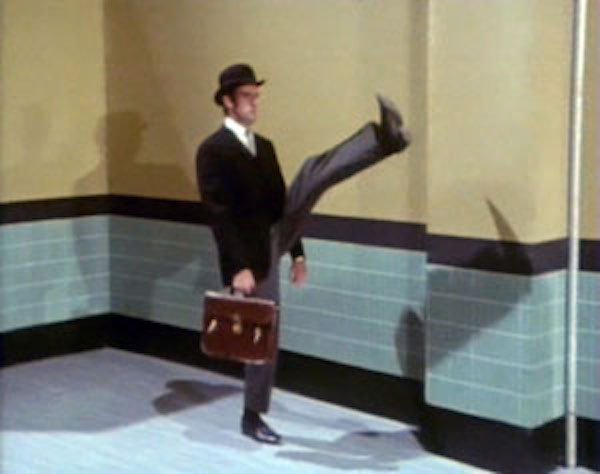
In a study from the U.S., scientists found adults could achieve global physical activity targets by walking inefficiently for just a few minutes each day.
The inefficient walking styles of Mr. Teabag and Mr. Putey, acted by John Cleese and Michael Palin in the 1971 Monty Python Ministry of Silly Walks sketch, have been shown to be more variable than usual walking, but their energy expenditure has never been measured.
In the study, researchers compared the energy expenditure of low-efficiency walking with high-efficiency walking.
They tested 13 healthy adults (six women, seven men) aged 22-71 years (average age 34) with no history of heart or lung disease, and no known gait disorder.
The team measured height and body weight and each participant was shown a video of the Ministry of Silly Walks sketch before performing three walking trials, each lasting five minutes, around an indoor 30-meter course.
In the first trial, participants walked in their usual style at a freely chosen pace.
For the next two trials, participants were asked to recreate, to the best of their ability, the walks of Mr. Teabag and Mr. Putey that they had seen in the video.
The researchers found that only the Teabag walk resulted in much greater energy expenditure—about 2.5 times that of usual walking.
For men and women combined, oxygen uptake during normal walking was 11.3 mL/kg/min (or 3.2 METs), which was similar to that of the Putey walk (12.3 mL/kg/min, or 3.5 METs).
However, the Teabag walk elicited an oxygen uptake of 27.9 mL/kg/min, or 8 METs, which qualifies as vigorous-intensity exercise.
In terms of energy expenditure, the team found exchanging just one minute of the usual walking style with one minute of Teabag walking was linked to an increase in energy expenditure of 8 kcal/min for men and 5 kcal/min for women.
The researchers estimate that adults could achieve 75 minutes of vigorous-intensity physical activity per week by walking in Teabag style—rather than their usual style—for about 11 min/day.
And substituting usual style steps with Teabag style steps for about 12-19 min/day would increase daily energy expenditure by approximately 100 kcal.
The team says this amount of walking in Teabag style would likely increase cardiorespiratory fitness, reduce mortality risk, and would require no extra time commitment because it replaces movement adults already do with higher energy physical activity, they add.
If you care about health, please read studies about the best time to take vitamins to prevent heart disease, and vitamin D supplements strongly reduce cancer death.
For more information about health, please see recent studies about plant nutrient that could help reduce high blood pressure, and these antioxidants could help reduce dementia risk.
The study was published in The BMJ.
Copyright © 2022 Knowridge Science Report. All rights reserved.



